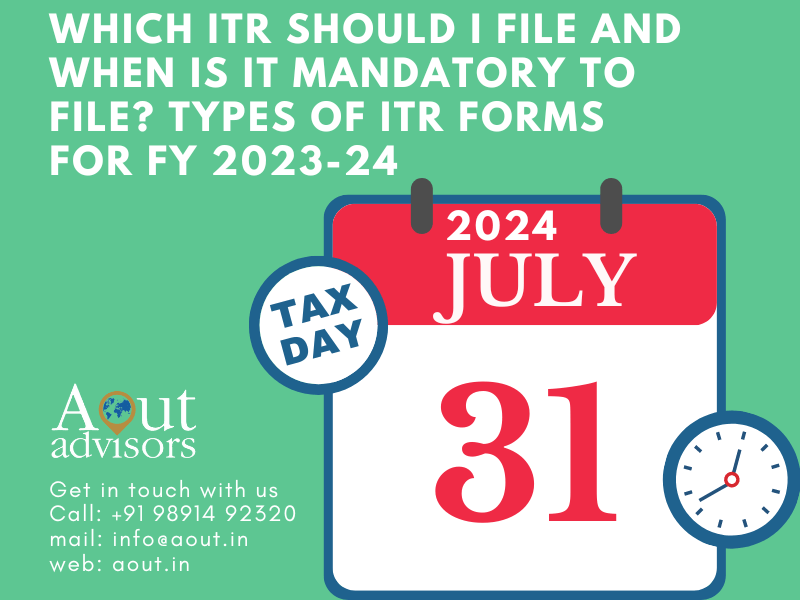
Everything you need to know about ITR File and Types of Income Tax Return
ITR stands for Income Tax Return. The Income-tax Act of 1961 issues all the ITR forms and explains the steps to follow. This article gives a detailed explanation of what ITR is and the different types of ITR forms.
An Income Tax Return (ITR) is a form where taxpayers report their income and the taxes they owe to the tax department.
There are 7 different ITR forms available: ITR-1, ITR-2, ITR-3, ITR-4, ITR-5, ITR-6, and ITR-7. Every taxpayer must file their ITR by the specified due date. The type of ITR form you need to use depends on your sources of income, how much you earn, and your category as a taxpayer, such as an individual, Hindu Undivided Family (HUF), company, etc.
Why should you file an Income Tax Return (ITR) and When is it mandatory to file income tax returns?
- To claim an income tax refund from the tax department.
- If you earned money from or invested in foreign assets during the financial year.
- If you want to apply for a visa or a loan.
- If you are a company or a firm, regardless of whether you made a profit or a loss.
- If you have a loss from your business or profession or under capital gains, you can’t carry it forward to future years unless you file your return before the due date
If your total income before deductions is higher than the basic exemption limit-
| Age Group | Basic Exemption Limit |
| For individuals below 60 years | Rs 2.5 lakh |
| For individuals above 60 years but below 80 years | Rs 3.0 lakh |
| For individuals above 80 years | Rs 5.0 lakh |
If your income falls below the basic exemption limit, you may still need to file your tax return if you meet any of these conditions:
- Deposited over Rs 1 crore in a ‘current’ bank account: You’re required to file a tax return if you’ve deposited Rs. 1 crore or more in one or more current accounts with a bank. However, this requirement doesn’t apply to deposits made in post office current accounts.
- Deposited over Rs 50 lakh in a ‘savings’ bank account: You must file a tax return if you’ve deposited Rs 50 lakh or more in one or more of your savings bank accounts.
- Spent over Rs 2 lakh on foreign travel: If your total expenditure on foreign travel, whether for yourself or others, exceeds Rs 2 lakh, you’re required to file a tax return.
- Electricity expenses exceed Rs 1 lakh: You’re obligated to file a tax return if your electricity consumption expenses amount to over Rs. 1 lakh during the previous year.
- TDS or TCS exceeds Rs 25,000: If the tax deducted at source (TDS) or tax collected at source (TCS) surpasses Rs 25,000 in the previous year. For senior citizens (above 60 years), this limit is Rs 50,000.
- Business turnover exceeds Rs 60 lakh: If you’re a business owner and your total sales, turnover, or gross receipts exceed Rs 60 lakh during the previous year, you must file a tax return.
- Professional income exceeds Rs 10 lakh: If you’re engaged in a profession and your gross receipts exceed Rs 10 lakh during the previous year, you’re required to file a tax return.
Navigating the tax filing process can be challenging, especially with the variety of Income Tax Return (ITR) forms available. Each form caters to different types of taxpayers and sources of income. For the Financial Year 2023-24 (Assessment Year 2024-25), understanding which ITR form to file is crucial for compliance and to avoid any penalties. Here’s a comprehensive guide to help you determine the appropriate ITR form for your needs.
ITR-1 (Sahaj) – Download Form Now
– Resident individuals (other than not ordinarily resident) with a total income up to ₹50 lakh.
– Income sources include salary, one house property, other sources (excluding winnings from lottery and racehorses), and agricultural income up to ₹5,000.
ITR-2 – Download Form Now
– Individuals and Hindu Undivided Families (HUFs) not having income from business or profession.
– Those with income from salary/pension, more than one house property, capital gains, and other sources, including foreign income.
– Individuals who are directors in a company or have investments in unlisted equity shares.
ITR-3 – Download Form Now
– Individuals and HUFs having income from business or profession.
– This includes income from salary/pension, house property, capital gains, and other sources.
– Those who are partners in a firm.
ITR-4 (Sugam) – Download Form Now
– Resident individuals, HUFs, and Firms (other than LLP) with total income up to ₹50 lakh.
– Income sources include business and profession computed under sections 44AD, 44ADA, or 44AE.
– Income from salary/pension, one house property, and other sources.
ITR-5 – Download Form Now
– For entities such as firms, LLPs, AOPs, BOIs, artificial juridical persons, cooperative societies, and local authorities.
ITR-6 – Download Form Now
– Companies other than those claiming exemption under section 11 (income from property held for charitable or religious purposes).
ITR-7 – Download Form Now
– Persons and companies required to furnish returns under sections 139(4A), 139(4B), 139(4C), 139(4D), 139(4E), or 139(4F), including those receiving income from charitable or religious trusts, political parties, scientific research institutions, and universities/colleges.
| ITR Form | Applicable to | Salary | House Property | Business Income | Capital Gains | Other Sources | Exempt Income | Lottery Income | Foreign Assets/Foreign Income | Carry Forward Loss |
| ITR-1 / Sahaj | Individual, HUF (Residents) | Yes | Yes(One House Property) | No | No | Yes | Yes (Agricultural Income less than Rs 5,000) | No | No | No |
| ITR-2 | Individual, HUF | Yes | Yes | No | Yes | Yes | Yes | Yes | Yes | Yes |
| ITR-3 | Individual or HUF, partner in a Firm | Yes | Yes | Yes | Yes | Yes | Yes | Yes | Yes | Yes |
| ITR-4 | Individual, HUF, Firm | Yes | Yes(One House Property) | Presumptive Business Income | No | Yes | Yes (Agricultural Income less than Rs 5,000) | No | No | No |
| ITR-5 | Partnership Firm/ LLP | No | Yes | Yes | Yes | Yes | Yes | Yes | Yes | Yes |
| ITR-6 | Company | No | Yes | Yes | Yes | Yes | Yes | Yes | Yes | Yes |
| ITR-7 | Trust | No | Yes | Yes | Yes | Yes | Yes | Yes | Yes | Yes |
The central government can exempt certain groups of people from filing income tax returns, in addition to those already exempt, such as individuals with income below the basic tax threshold and non-residents without income from India. However, at present, the central government has not announced any new exemptions.
Read More: ITR Filing Last Date FY 2023-24 and Consequences of Missing ITR Return Filling
Our team of Chartered Accountants (CAs) specializes in preparing and e-filing income tax returns, ensuring compliance with relevant tax provisions and optimizing tax benefits for your business. Stay ahead of your taxes! File early with Aout Advisors‘s few-step process and enjoy peace of mind today!

